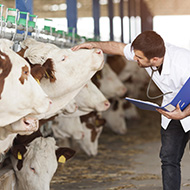BCVA expresses disappointment over 'under care' reforms

The BCVA has responded to the RCVS reforms to 'under care' guidance for veterinary professionals.
The British Cattle Veterinary Association (BCVA) has expressed disappointment over RCVS reforms to 'under care' guidance, saying the changes 'have the potential to impact the vital primary farm vet-client relationship'.
A statement released by the organisation on Friday (27 January) also stresses that the amendments - approved by RCVS Council earlier this month - present 'a challenge to the sustainability of farm animal practice' and have “implications for animal welfare'.
Colin Mason, BCVA president, said: “An established vet-farmer relationship, along with their vet-led team, involves detailed on-farm knowledge – this is crucial for the effective provision of services and the appropriate prescribing of veterinary medicines. Remote prescribing outside of that primary relationship will be seen by most farm vets to present a risk, particularly with food producing animals.
“Colleagues across our profession are concerned about this approach, which is contrary to BCVA’s input into the ‘under care’ consultation and all subsequent discussions with the Royal College. We recently met with RCVS at a joint officers meeting to illustrate some of the challenges private farm vets are facing, yet it seems this decision went ahead without considering the presented evidence, or without the support of those in our profession who will have to operate within its framework.”
Under the new guidance, veterinary surgeons will no longer be required to conduct a physical examination of the animal before prescribing POM-V medications. Instead, they will be able to use their professional judgement to consider what is appropriate in a specific situation.
Incorporated in the guidance are a number of safeguards to protect animal health, including a requirement that veterinary surgeons must perform a 24-hour follow-up service involving examination if they do not physically see the animal before prescribing.
'Where a veterinary surgeon is not able to provide this service themselves, they should arrange for another veterinary service provider to do so' the guidance states. 'This arrangement should be made before veterinary services are offered and confirmed in writing as part of the conditions of service agreed by the client'.
RCVS Council agreed to implement the changes between 1 June and 31 December 2023, subject to a final review at its next meeting in March.
The BCVA added: 'The details about how this will affect farm animal practice need to be worked through and BCVA will urge RCVS to review the decision. We will continue to represent the views of our profession. As further details emerge we’ll share that information and work hard to support our members.'



 The Veterinary Medicines Directorate (VMD) is inviting applications from veterinary students to attend a one-week extramural studies (EMS) placement in July 2026.
The Veterinary Medicines Directorate (VMD) is inviting applications from veterinary students to attend a one-week extramural studies (EMS) placement in July 2026.